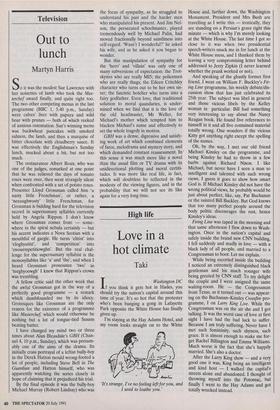Television
Out to lunch
Martyn Harris
o it was the modest Sue Lawrence with her noisettes of lamb who took the Alas- terchef award finally, and quite right too. The two other competing menus in the last programme (BBC 1, 5.40 p.m., Sunday) were calves' liver with papaya and wild boar with prunes — both of which reeked of anxious ostentation. Sue's winning menu was buckwheat pancakes with smoked salmon, the lamb, and then a marquise of bitter chocolate with cloudberry sauce. It was effectively the Englishman's Sunday lunch, mucked about a bit, but not too much.
The restaurateur Albert Roux, who was one of the judges, remarked at one point that he was relieved the days of tomato roses were over, then went strangely silent when confronted with a set of potato roses. Presenter Lloyd Grossman called him 'a nasty little Frenchman', or rather, a `necaughwusty' little Frenchman, for Grossman is bidding hard for the television record in supernumary syllables currently held by Angela Rippon. I don't know where Grossman comes from — some- where in the spiral nebula certainly — but his accent indicates a Nova Scotian with a mouthful of gargle. He turns 'elitist' into `eloghyutist', and 'competition' into `cwourrnpetitiowghn'. But the real chal- lenge for the supernumary syllabist is the monosyllables like 'a' and 'the', and when I heard Grossman pronounce 'two' as `teeghyoowgh' I knew that Rippon's crown was trembling.
A fellow critic said the other week that the awful Grossman got in the way of a perfectly good programme — a remark which dumbfounded me by its idiocy. Grotesques like Grossman are the only reason for the existence of a programme like Masterchef, which would otherwise be nothing but a lot of tongue-tied Susans beating batter: I have changed my mind two or three times about Alan Bleasdale's GBH (Chan- nel 4, 10 p.m., Sunday), which was presum- ably one of the aims of the drama. Its initially crass portrayal of a leftist bully-boy in the Derek Hatton mould wrong-footed a lot of people, including Steve Bell in The Guardian and Hatton himself, who was apparently watching the series closely in hope of claiming that it prejudiced his trial.
By the final episode it was the bully-boy Michael Murray (Robert Lindsay) who was the focus of sympathy, as he struggled to understand his past and the harder men who manipulated his present. And Jim Nel- son, the persecuted schoolmaster, played tremendously well by Michael Palin, had moved fractionally beyond saintliness into self-regard. 'Wasn't I wonderful?' he asked his wife, and as he asked it you began to wonder.
But this manipulation of sympathy for the 'hero' and 'villain' was only one of many subversions of expectation: the Trot- skyites who are really MI5; the policemen who are really thugs; the Eileen Critchley character who turns out to be her own sis- ter; the fascistic hotelier who turns into a fairy godfather. Even love, that traditional solution to moral quandaries, is under- mined when we find that it is the love of the old headmaster, Mr Weller, for Michael's mother which tempted him to blacken Michael's name and effectively to set the whole tragedy in motion.
GBH was a dense, digressive and satisfy- ing work of art which combined elements of farce, melodrama and mystery story, and which demanded constant reassessment. In' this sense it was much more like a novel than the usual film or TV drama with its unidirectional plotting and moral certiti- tudes. It was more like real life, in fact, which will doubtless be reflected in the modesty of the viewing figures, and in the probability that we will not see its like again for a very long time.


















































 Previous page
Previous page